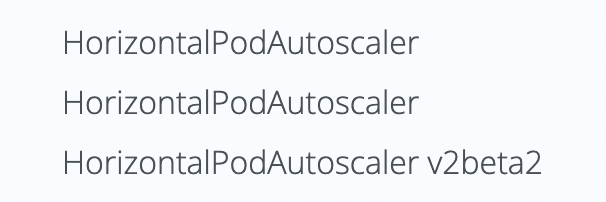Kubernetes の apiVersionの調べ方
- リソース (Deployment, Service etc..) のapiVersionに何を書けばいいのか?
-
apps?apps/v1?apps/v1beta1??
-
- Kubernetesの新しいAPIを試したいときどうすればいいのか?
のやり方が意外とどこにも書いてないのでまとめ。
KubernetesのリソースAPIは、そのAPIがどのAPIGROUPに属しているかで apiVersion の書き方が異なる。
それぞれのケースで、
| ケース | 書き方 |
|---|---|
| 特定のAPIGROUPに属している場合 | apiVersion: (APIGROUP)/(APIVERSION) |
| 特定のAPIGROUPに属していない場合(= Core groupに属する) | apiVersion: v1 |
と記述する必要がある。
1. api-resources コマンドで、リソースとAPI GROUPの対応を調べる
リソースと APIGROUP の対応は kubectl api-resources で出力できる。
注意:
- 古いkubectlでは実装されていない。
v1.12で存在確認 - 現在のコンテキストにおける情報らしいので、複数のクラスタを扱っているときは接続先に注意
$ kubectl api-resources
NAME SHORTNAMES APIGROUP NAMESPACED KIND
bindings true Binding
componentstatuses cs false ComponentStatus
configmaps cm true ConfigMap
endpoints ep true Endpoints
events ev true Event
limitranges limits true LimitRange
namespaces ns false Namespace
nodes no false Node
persistentvolumeclaims pvc true PersistentVolumeClaim
persistentvolumes pv false PersistentVolume
pods po true Pod
podtemplates true PodTemplate
replicationcontrollers rc true ReplicationController
resourcequotas quota true ResourceQuota
secrets true Secret
serviceaccounts sa true ServiceAccount
services svc true Service
mutatingwebhookconfigurations admissionregistration.k8s.io false MutatingWebhookConfiguration
validatingwebhookconfigurations admissionregistration.k8s.io false ValidatingWebhookConfiguration
customresourcedefinitions crd,crds apiextensions.k8s.io false CustomResourceDefinition
apiservices apiregistration.k8s.io false APIService
controllerrevisions apps true ControllerRevision
daemonsets ds apps true DaemonSet
deployments deploy apps true Deployment
replicasets rs apps true ReplicaSet
Deployment は apps か extensions に属していることがわかる。
$ kubectl api-resources | grep Deployment
deployments deploy apps true Deployment
deployments deploy extensions true Deployment
なぜ2つあるのかというと、移行過渡期のため。
https://github.com/kubernetes/kubernetes/issues/61430
ということで apps を使えばいいらしい。
APIGROUPが空のリソースは Core groupに属するので、 apiVersion: v1 でよい。
それぞれのAPIGROUPで利用可能なversionを調べる
Core以外のAPIGROUPに属しているもののうち、 どのバージョンが使えるかは kubectl api-versions で出力することができる。
注意:
- 現在のコンテキストにおける情報らしいので、複数のクラスタを(ry
$ kubectl api-versions
admissionregistration.k8s.io/v1beta1
apiextensions.k8s.io/v1beta1
apiregistration.k8s.io/v1
apiregistration.k8s.io/v1beta1
apps/v1
apps/v1beta1
apps/v1beta2
authentication.k8s.io/v1
authentication.k8s.io/v1beta1
authorization.k8s.io/v1
authorization.k8s.io/v1beta1
autoscaling/v1
autoscaling/v2beta1
batch/v1
batch/v1beta1
certificates.k8s.io/v1beta1
cloud.google.com/v1beta1
extensions/v1beta1
metrics.k8s.io/v1beta1
networking.k8s.io/v1
policy/v1beta1
rbac.authorization.k8s.io/v1
rbac.authorization.k8s.io/v1beta1
scalingpolicy.kope.io/v1alpha1
scheduling.k8s.io/v1beta1
storage.k8s.io/v1
storage.k8s.io/v1beta1
v1
先程の apps groupに絞ってみると、
$ kubectl api-versions | grep apps
apps/v1
apps/v1beta1
apps/v1beta2
ということで、上記のいずれかを使用すればいいらしい。
複数バージョンのうち、何を使うか?
公式のAPIリファレンスドキュメントを参照する。
例えばDeployment の apps/v1beta2 では
https://kubernetes.io/docs/reference/generated/kubernetes-api/v1.10/#deployment-v1beta2-apps
のように、バージョンによって機能差分があることがわかる。
<2022-07-20 update>
Deploymentはv1実装でされているので、betaがとれている。
例えば現時点では、HorizontalPodAutoscaler には複数バージョンが存在し、それぞれ機能差分があるので、公式ドキュメントを確認する

ドキュメントを見て、適切なバージョンを選択する。